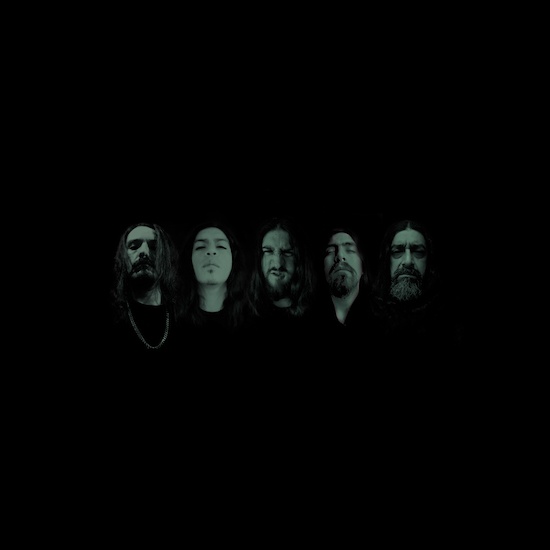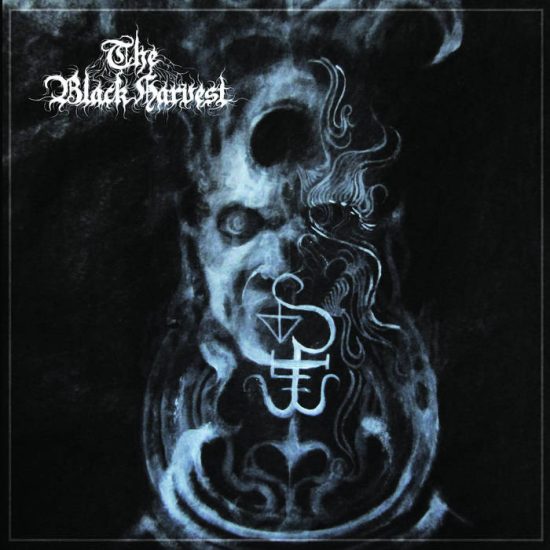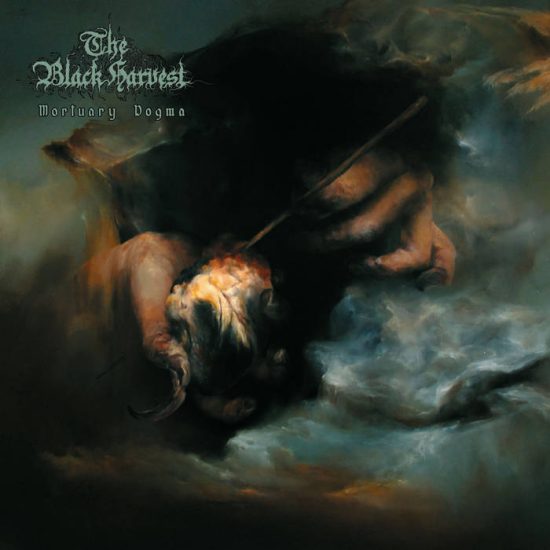
(On this Bandcamp Friday we lead off with a new interview by Comrade Aleks of David Briones, founder of the Chilean death/doom band The Black Harvest, whose newest album (an excellent one) was just released this past March by Australis Records.)
David Briones started his career in Chilean underground with the death metal band Son in Curse. He has performed vocals and guitars there since 2002. He does the same in the death/crust band Rotten Hate and – what’s more important – he runs the death-doom band The Black Harvest.
Technically started in 2004, the band was almost inactive until 2014 when the first demos managed to appear. The band signed a deal with local label Australis Records, and as result the label released two albums – the self-titled debut (2017) and the fresh sophomore work Mortuary Dogma (2023). The new material absorbed all the best from the UK Three legacy, and Paradise Lost’s fans will dig “The Succubi Delight”, a track which represents the band as an official video.
Let’s support this killer band and pay some attention to David’s story of The Black Harvest and things related to the Chilean underground.
******
Hi David! How are you? What’s new in your area?
Hi. Everything is going well over here. It’s autumn and heading for winter, so it’s a bit cold and there’s a lot of rain. But that’s how the south of Chile is.
I see that the band formed in 2004, but the first recording of The Black Harvest is a promotional demo from 2014. What happened during the first decade?
I did some groundwork in early 2004 to see how I could get the project on track. I was alone on this project. Besides, I was working on songwriting and recording with Son In Curse, so I didn’t really have the time to dedicate 100% to this project. Plus, the concept was not appealing to the musicians I knew at that time. Death Metal, Thrash Metal, and Black Metal were hitting strong around here. So for those reasons I started this journey alone.

The first promo (2014) and the demo Mysterious Glory of Immortality (2015) were recorded by you and Miguel Velasquez (vocals), but the self-titled full-length album was released in 2017 with three new members. Did your search for a stable lineup delay the release?
The search for a stable lineup was always a priority. But like I told you, I wasn’t finding the right people to be able to settle as a band. We could say that between 2004 and 2014 it remained as a blueprint. After the release of the 2015 Demo, the members that are present in the first album started to join the band. Miguel on vocals, Lino on drums, Manuel on bass, and Moisés on guitars. The guys successfully clicked with the style of the band and we were able to release the album.
And I can’t say that this was the cause of the delay, since the release of the demo was why the album came out in the first place. It took about two years to write, rehearse, and realize the production process.
What was your plan for The Black Harvest album? What took you into death territory? You were originally on the death metal side with Son in Curse, right?
The lyrics basically approach the world of death for the reason that Son in Curse was already heading towards that theme in a way. But I was able to put more emphasis on that for The Black Harvest. The theme of Son in Curse was oriented towards things more related to Crowley and the connection we have with the cosmos. That’s why for TBH the lyrics and the philosophy of the band focused on existential issues and how we deal with life.
Death is interesting from a philosophical point of view, where you can get a lot of ideas to write about. Because depending on how you see it, it can be: Renewal and the end of a cycle, having awareness of death as something terrifying, or accepting death as the end of a process. If you expand and open up the concept, there is a lot to think about.
I have always been inclined towards Doom metal in all its nuances and in The Black Harvest I found a way to develop that creative field. Prior to Son in Curse I was already involved in the scene with a Doom band.
You live in Puerto Montt, Los Lagos. Quite far from Santiago, the capital of Chile. Does this hinder your chances of promoting the band?
If we look at it in terms of performing live, yes. The geography of this country makes those things a bit difficult because sometimes you have to travel long distances to get to perform in other cities. The bus fares here are really high and the plane fares are similar. There are about 1,100 kilometers from Puerto Montt to Santiago, which is quite a considerable distance.
On some occasions, people have tried to do gigs with us in Santiago, but due to financial issues it didn’t work out. Australis Records is based in Santiago, so physical copies of our albums are easy to find there. In that sense, social media and digital platforms are a great aid for promotion.
How much local influence is there in your music? Are your surroundings reflected in any way in the songs of The Black Harvest?
There is not much local influence in terms of style. We lean more towards the Doom Metal scene of the early ’90s… with bands like Paradise Lost, My Dying Bride, and Anathema, to name a few examples. By the end of that decade I was in a local band called Aradis which was like Doom Dark Metal, taking my first steps into the style.
In this part of the world days are grey, windy, cold, and very rainy most of the year. Autumn is basically like winter. Plus, the beauty that nature offers here is marvelous. All these factors combined are a source of inspiration for songs to come out. Puerto Montt is located in a geographical area called Seno del Reloncaví, surrounded by volcanoes. In fact, the Calbuco volcano, which is less than 30 kilometers from the city, erupted a couple of years ago. To witness that and to realize how small we are compared to this world’s phenomena was a really beautiful and breathtaking experience.
Mythology is also fascinating. The stories you hear about sorcerers and death are so intriguing. The darkness of human beings is present everywhere.

The new album Mortuary Dogma was recorded with the new vocalist Jorge Quilape. How was your interaction with him? Was he involved in songwriting?
There was a gig at Barrabass, a bar located downtown in Puerto Montt. At that time, our first album was in the process of manufacturing. Jorge was in a band called Eucryphia and they were performing at that event. I paid attention to his vocal performance and then I searched the media for more information about the band. I really liked their concept. I didn’t know him personally and I only knew the band by name.
When Miguel unexpectedly left the band after the release of the first album, I didn’t hesitate to contact him through social media to ask him to join The Black Harvest. Jorge accepted the challenge and we started doing some live shows. They turned out very well. Jorge collaborated with some lyrics in the production of the band’s second album and I pretty much left vocal duties to his full layout. While working on his tracks, we adjusted some harmonies and the switching between growls and clean vocals. But the vocal melodic work was entirely his own creation.
What kind of key differences do you see between Mortuary Dogma and the self-titled debut? Did you look for any development or did you feel you had found the right formula for your sound?
For starters, the vocal work is absolutely different, which leads to the fact that in this second release harmonies are appreciated in a different way, so to speak. I also used a different method for the sound production process. I didn’t want this second album to sound like a second part to the previous one.
Songwriting-wise, the songs turned out longer. But it was a matter of doing things on the fly. We didn’t intend to write long songs for the sake of writing long songs. The lyrics here go a little deeper into the theme that we had in the previous album… we relied more on the use of metaphors. If you broadly read the lyrics, you can interpret them in many different ways. The concepts were used in such a way that you can create your own interpretation.
How long did it take you to record these songs? Were there any problems during the recording session?
Two and a half years. We started by writing and laying down the groundwork for the songs. That was the pre-production part. At the same time, we began to write the lyrics and discuss the artwork. Once the groundwork was ready we focused on the recording of each instrument. While Lino worked on his arrangements, Moisés focused on rhythm and acoustics sections. Jorge and I worked on some lyrics individually and Manuel began to work on the bass parts.
All this took place in the 2021. Due to work-related issues, I was traveling further south and I did not have the means to work on my part. That was the reason why most of the work was delayed. Vocals were recorded and edited in about 5 months, during the final stretch of the process in 2022. Mixing and mastering took me about 3 months. The final master was ready in August 2022. And the layout in September approximately.
Australis Records has just released the demo Of Wizards and Demons – D-R MMXVI, whose track list almost completely doubles The Black Harvest album’s track list. What is the story behind this demo? Why did you decide to release it?
I thought it would be interesting for that record to be present in our discography, as there are some songs that were written differently. Musical arrangements are different. And most importantly, that demo allowed us to consolidate the project as a band, since in the 2015 demo we were only two people and in Of Wizards and Demons each instrument was already played by someone else.
After Miguel joined the band, I showed Lino (the drummer, whom I’ve known for many years) the concept of the debut album, which was really drum-programmed tracks, and he thought it was an interesting concept. At that time, Miguel was working with his own band called Ruined, and Manuel (the bass player) was part of that band. He was the second one recruited to join the band. After a few conversations that took place during the same period, I brought Moisés into the band.
Once I handed Lino the groundwork, he listened to it for a while and then we started rehearsing… that was around the end of 2015. We both rehearsed in a room I had where I lived at the time. There was some equipment and I bought some microphones. Also, I got help from a friend (Rodrigo “Chuck Norris” Cepeda) who provided me with some gear to be able to record. He even sold me an unused mixer that he had and with which we started recording the drums. I think there were about 4 microphones that we used only for Lino’s recording. That recording was all on one track.
Since we already had that recorded, then I started recording guitars with Moisés, and Manuel started to do his bass work as well. Guitars were recorded directly from a distortion pedal, no mic or pre-amp. We used a Digitech distortion (Deathmetal) pedal through the Mixer output direct to the pc. I edited them in the DAW I was using at the time. Manuel‘s bass was recorded with a microphone and an amp.
Once all that was ready and Miguel had arranged the lyrics so that they would fit well in the songs, he started recording. We made several tests of how the whole thing could sound as we intended to do some backing vocals and panning with effects.
As a funny side note, my sons, Lucas and Diego, who at that time were very young, would come into the room to play with me. This interrupted the recordings, so I had to prepare them something to drink in order to keep them quiet while listening to us recording. Sometimes, one of them would drink milk in my lap, while I would play with the other one. At that time they were about 3 and 4 years old.
There are examples of Chilean doom bands that were able to have a somewhat big push and reach new listeners in Europe and even a little bit beyond. Poema Arcanvs, Procesión, Capilla Ardiente as well. How do you see the prospects for The Black Harvest? Do you see an opportunity to make the band bigger?
We have plans to do things to keep the band growing. But first we intend to have a good set of songs for live shows backed with good production. We hope to have proper promotion and contact the right people to reach the European public and other places. We also hope to be performing in some major festival in the near future.
What are your plans for the remainder of 2023?
Well… To be part of some gigs in the country and if something else works out in other places that would be awesome. To promote our latest release Mortuary Dogma, for which we are considering making a second videoclip. We also intend to do something interesting with the demo Mysterious Glory of Immortality soon. Thank you very much for the interview. Greetings to everyone.
https://www.facebook.com/theblackharvest
https://theblackharvest.bandcamp.com
